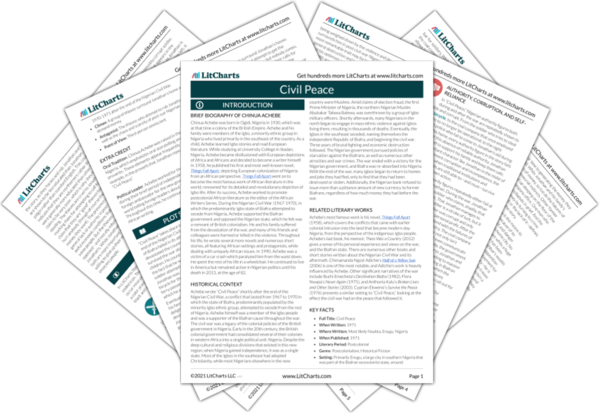War and Peace
Chinua Achebe’s “Civil Peace” begins with the main character, Jonathan, expressing his joy about the end of the Nigerian civil war, which raged from 1967 to 1970 between Nigeria and a failed secessionist state called Biafra. The cost of the war was terrible, illustrated by the fact that Jonathan feels lucky to have lost only his youngest son out of his six-person family, and by his astonishment when he discovers that his little house…
read analysis of War and PeaceOptimism and Faith
Jonathan, the main character of “Civil Peace,” repeats the same phrase numerous times throughout the story: “Nothing puzzles God.” As the phrase implies, God acts as a guiding force for Jonathan. Jonathan’s mantra and his faith provide him with the emotional strength to accept both the good and the bad in his life without being weighed down by the violence and devastation which surrounds him in post civil-war Nigeria. Indeed, Jonathan’s most remarkable trait…
read analysis of Optimism and FaithAuthority, Corruption, and Self-reliance
In “Civil Peace,” Nigerian authority figures both during and after the war are repeatedly shown to be unreliable and corrupt. From the soldier who tries to steal Jonathan’s bicycle, to the coal company that once employed him but seems to no longer be operational, to the night watchmen and police who fail to come to Jonathan’s aid during the robbery of his home, every authority figure in the story fails him. As a…
read analysis of Authority, Corruption, and Self-reliance
Money and Survival
Discussion of money is constant throughout “Civil Peace.” In particular, much of the story describes the various entrepreneurial ventures through which Jonathan, who is almost destitute at the end of the Nigerian civil war, supports himself and his family during the newfound peace. Through its constant focus on Jonathan’s efforts to make money, along with scenes that show other characters’ desperation to get money, the story suggests that money is not just nice to…
read analysis of Money and Survival






